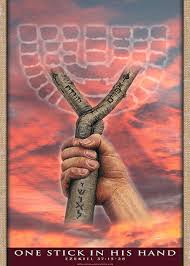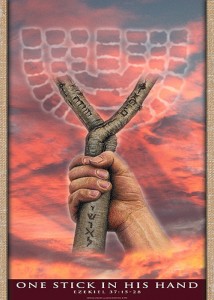Joseph’s Brothers Didn’t Recognize Him as Their Savior (Gen 42–44)
Joseph’s brothers didn’t recognize that Joseph was their savior (from famine). Prophetically, and in our time, most Jews neither recognize Christians (the descendants of Ephraim and Manasseh) as their brothers, nor that the Jesus of Christianity is their Savior who will supply spiritual food for which their hearts are longing (but not finding in rabbinical Judaism), a that he died to redeem them from their sins.

The Scriptures prophecy that this spiritual blindness would occur to many of the children of Israel, including the Jews. We read about this in Isaiah 8:14 and Romans 11:25.
The Concept of Deliverance Through Substitution (Gen 42:17–19, 24)
Joseph made known to his brothers a way of deliverance through substitution in that they would all be saved if Simeon were held back for ransom.
Continuing our comparison between Joseph and Yeshua, what religious people-group in the last two thousand years has been making known to the world the way of deliverance through the substitutionary (sacrificial, blood atonement) work of Messiah Yeshua the Son of Joseph at the cross of Calvary? The Jews or the Christians?
Interestingly, even though Joseph suggested that substitution be made so that the brothers might live (verse 19), it was Judah who ended up laying down his life as a ransom for Benjamin, his youngest brother, by becoming surety for him (Gen 44:32–34). In prophetic fulfilment of this antitype, we see that it was Yeshua the Messiah, son of Joseph, who descended from Judah, and who offered to lay down his life that his brothers (you and me) might live.
Judah’s actions are antetypical of those of Yeshua the Messiah in the following areas:
- Both sought to please their fathers.
- Both acted out of unconditional love for their younger brother.
- Both stood to gain nothing personally, but rather stood to lose much, if their plan did not work. Judah, a prince, would become a slave in Egypt; Yeshua would become a slave to death and hell, if he sinned.
- Both Judah and Yeshua were willing to lay down their lives for their brethren because of their love for their father (Gen 44:18–34; John 8:28; chapter 17).
It is interesting to note that Matthew Henry, the Christian Bible commentator, draws a similar analogy between Judah’s actions here and Messiah Yeshua.
Additionally, Judah’s love for his father and Benjamin, and his willingness to lay down his life as a ransom to become a slave in Egypt to Joseph, is analogous to Messiah Yeshua’s love for the lost sheep of the house of Israel to whom he came to reach out and to ransom in order to bring them back into the sheepfold of Israel (John 10:15–16; Matt 10:6; 15:24).
Judah Approaches Joseph (Gen 44:18)
Judah came near to Joseph was willing to lay down his life for his younger brother (Gen 44:18–34). This is another prophetic picture of the future Messiah who would come to this earth in willingness to give his life as a ransom to save his brothers. The Scriptures call Yeshua the “Lion of the tribe of Judah” (Rev 5:5) who initiated the process in seeking to save his brothers who were spiritually lost (Rom 5:8; Luke 19:10; Matt 18:11; ), and who Yeshua referred to as the lost sheep of the house of Israel (Matt 10:6; 15:24).


